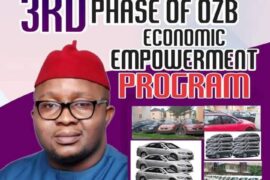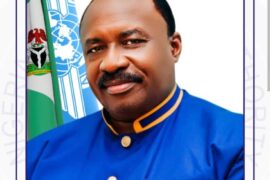By Amara Akata
A revered politician once said, “There should be a provision in our law that anyone without a second address should aspire to become a member of the National Assembly; that is the only way we can keep charlatans out of the Red and Green Chambers. Also, anyone coming here (National Assembly) should have been cured of hunger and the kind of poverty that would make them engage in unwholesome acts.”
The concept of “second address” is that that person must be gainfully employed in any capacity other than putting down “politician” or “politics” when people inquire about their careers. This will ensure that a member of the National Assembly can truly earn the affixing of “distinguished” or “honourable” to their names.
Sadly, this concept is lost on Ikenga Ugochinyere Ikeagwuonu, a member representing Ideato Federal Constituency in the House of Representatives, who has in recent months confirmed that he does not have a second address. If he once had it then he lost it even before coming to the National Assembly.
The streets are harsh, and people must do what they must to survive. With all the ethical dilemmas it poses, this approach was excusable for Ugochinyere when he was on the street. A hustler. The archives document all the questionable briefs he accepted in the name of being an activist. It did not matter how dubious the positions he canvassed were, once there was a paying client then Ikenga Ugochinyere was available to run it.
And he did well for himself. His presence in the House of Representatives attests to that. From his hustle on the streets, he got the network, social capital and funding to make it into parliament. Some had labelled him a “cash and carry” activist or activist for hire. But he got into parliament.
But one would have thought that one could take the mud out of Ikenga Ugochinyere’s pig or take the jungle out of his monkey. No. Not even the decorum imposed by the hallowed post he now occupies can stop him from descending into the street hustle he has become accustomed to. He continues to ply his wares and to the highest bidder.
Time there was when Ikenga Ugochinyere was all hyper about defending the position of the Minister of the Federal Capital Territory (FCT), Mr Nyesom Wike, who is also the immediate past governor of Rivers State. Our commercial activist was defending Wike’s interests against his successor, Sir Siminalayi Fubara. Successor and predecessor are estranged.
In those days – and this was not so long ago, Ikenga Ugochinyere plied his wares and marketed Wike as the saint while, as expected, Fubara was the evil imp.
Wike was once a close ally of Ugochinyere. Their relationship was presented as being based on mutual interests and a shared vision for a better Nigeria. His vocal support for Wike’s policies and his defence against political adversaries were misread as a testament to his loyalty and commitment to the cause. But as the dynamics of finances and politics changed, so did Ugochinyere’s allegiances.
Enter Siminalayi Fubara. His ascendency to power has coincided with a heavy financial war chest, as is expected of a man of means in political life. Ugochinyere took a sudden turn toward Fubara as the opportunistic merchant he is rather than being guided by shared ideas of ideological identity. A stark reminder that his activism is for sale to the highest bidder.
Today, with our activist having made a U-turn, he now says, “Fubara is not the aggressor; Wike is the aggressor.” This commercial activist is not new to this kind of volte-face. A routine check of his past activities before going to Parliament will unearth a series of instances when he radically altered his stance once his targeted mark had paid up, or a client failed to meet the terms of the agreement.
So, the pivot from Wike to Fubara becomes understandable. Wike was his client. But realisation set in that Wike will not part with FCT’s funds while Fubara does giveaways with Rivers State money. Today, he is fighting the Wike because Fubara is the man who can pay the bills. Cash and carry activism must be anchored somewhere. Where better than in the camp of the willing buyer? Fubara.
It is unfortunate. People had thought that the rise of Ugochinyere was due to his determination to always hold the powerful accountable, that he was a vocal critic of corruption and a stout defender of democratic principles, he won respect from many Nigerians who regarded him as a source of hope in a political system infested with malfeasance. Some people even still think his activism was not about noise but the actualization of change to ensure the voices of the marginalized are heard.
However, “cash and carry activism” has been the operative term that defines Ugochinyere, and his recent endeavours have cemented this notoriety. The term, usually describing activism for financial reasons rather than any genuine interest in social justice, has marred what would have otherwise been a sterling reputation. His sudden shift from Wike, his client in the past, to Fubara, who is perceived as having deeper pockets, validates his brand of activism.
Those who can read between the lines say that Ugochinyere’s actions undermine the very principles he once pretended to stand for. Yet, by aligning himself with those who can “pay the bills,” he risks eroding the trust and credibility he built over the years. A situation worsened by the potential to tarnish the House of Representatives with his side hustle and also damage those who, because of him, once believed that activism, at its core, should be about advocating for the greater good and challenging the status quo, not about personal gain or financial enrichment and that his stint at the National Assembly would give greater expression to this.
However, it is essential to consider the complexities of Nigerian realities. Hunger is no respecter of anyone. The harsh realities of political and economic survival often necessitate alliances and compromises that a person is compelled to accept even when they appear contradictory. Ugochinyere’s shift in allegiance could be seen as a pragmatic decision to escape hunger and penury, possibly to also build up financial reserves for when he is out of office. Indeed, the transformation of Ikenga Imo Ugochinyere from an idolised activist to a figure of cash-and-carry activism tells a lot about whom he has always been.
As much as his recent actions have been questioned on many grounds, one must also consider that activism and political struggle are processes marked by hard choices, especially when hunger is involved. Ultimately, the true test of Ugochinyere’s legacy will be how well he can continue to deceive the populace that his fiscal pragmatism does not undermine his commitment to social justice and democratic principles. Ugochinyere must, in the meantime, find a second address because the cash-and-carry reputation he has created for himself could make life outside of the Parliament tough for him when the time comes, which is sooner than he thinks.
Nigerians already know the trade Ugochinyere plies, and the right-thinking ones among them know that, stripped of the clout that comes from being a member of the House of Representatives, this is just another hustler. It is Fubara who must be wary. Once this cash-and-carry activist finds a higher bidder, the Rivers State governor will be left up a creek without a paddle.
Akata is a public affairs analyst based in Abuja.




